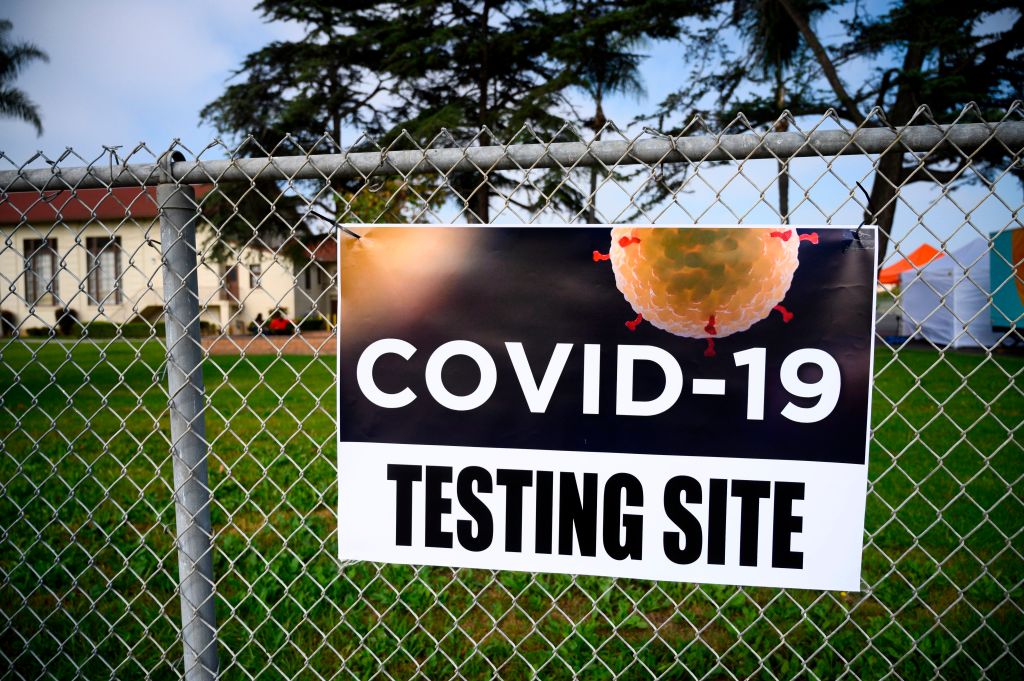1st known U.S. case of Brazil COVID-19 variant found in Minnesota


A free daily email with the biggest news stories of the day – and the best features from TheWeek.com
You are now subscribed
Your newsletter sign-up was successful
The Minnesota Department of Health announced on Monday it has recorded the first known case in the U.S. of the highly transmissible COVID-19 variant that has been spreading through Brazil.
Known as the P.1 variant, it was detected amid a surge of cases in Manaus, Brazil. Minnesota health officials said the patient is a resident of the Twin Cities area who recently traveled to Brazil, and the strain was found via genomic sequencing of random blood samples. The person was tested on Jan. 9, and is now in isolation. Ruth Lynfield, Minnesota's state epidemiologist, said this is a reminder why "it is so important to limit travel during a pandemic as much as possible."
Scientists are closely studying three COVID-19 variants: P. 1, as well as B.1.1.7, first detected in the United Kingdom, and B1.351, first identified in South Africa. Virologists said the variants are independent of one another but there is some overlap in the mutations. The U.K. variant is spreading now in the U.S., but the South Africa variant has not yet been detected. Virologists are especially concerned that the Brazil and South Africa variants contain mutations that may evade the protections of some antibodies.
The Week
Escape your echo chamber. Get the facts behind the news, plus analysis from multiple perspectives.

Sign up for The Week's Free Newsletters
From our morning news briefing to a weekly Good News Newsletter, get the best of The Week delivered directly to your inbox.
From our morning news briefing to a weekly Good News Newsletter, get the best of The Week delivered directly to your inbox.
William Hanage, an epidemiologist at the Harvard T. H. Chan School of Public Health, told The Washington Post on Monday the Brazil variant is "probably the one causing the most concern among people watching this. It is fair to say that P.1 is the object of very, very serious attention and concern among epidemiologists. We don't know why it has been so successful in Manaus."
A free daily email with the biggest news stories of the day – and the best features from TheWeek.com
Catherine Garcia has worked as a senior writer at The Week since 2014. Her writing and reporting have appeared in Entertainment Weekly, The New York Times, Wirecutter, NBC News and "The Book of Jezebel," among others. She's a graduate of the University of Redlands and the Columbia University Graduate School of Journalism.
-
 6 of the world’s most accessible destinations
6 of the world’s most accessible destinationsThe Week Recommends Experience all of Berlin, Singapore and Sydney
-
 How the FCC’s ‘equal time’ rule works
How the FCC’s ‘equal time’ rule worksIn the Spotlight The law is at the heart of the Colbert-CBS conflict
-
 What is the endgame in the DHS shutdown?
What is the endgame in the DHS shutdown?Today’s Big Question Democrats want to rein in ICE’s immigration crackdown
-
 Trump HHS slashes advised child vaccinations
Trump HHS slashes advised child vaccinationsSpeed Read In a widely condemned move, the CDC will now recommend that children get vaccinated against 11 communicable diseases, not 17
-
 FDA OKs generic abortion pill, riling the right
FDA OKs generic abortion pill, riling the rightSpeed Read The drug in question is a generic version of mifepristone, used to carry out two-thirds of US abortions
-
 RFK Jr. vaccine panel advises restricting MMRV shot
RFK Jr. vaccine panel advises restricting MMRV shotSpeed Read The committee voted to restrict access to a childhood vaccine against chickenpox
-
 Texas declares end to measles outbreak
Texas declares end to measles outbreakSpeed Read The vaccine-preventable disease is still spreading in neighboring states, Mexico and Canada
-
 RFK Jr. shuts down mRNA vaccine funding at agency
RFK Jr. shuts down mRNA vaccine funding at agencySpeed Read The decision canceled or modified 22 projects, primarily for work on vaccines and therapeutics for respiratory viruses
-
 Measles cases surge to 33-year high
Measles cases surge to 33-year highSpeed Read The infection was declared eliminated from the US in 2000 but has seen a resurgence amid vaccine hesitancy
-
 Kennedy's vaccine panel signals skepticism, change
Kennedy's vaccine panel signals skepticism, changeSpeed Read RFK Jr.'s new vaccine advisory board intends to make changes to the decades-old US immunization system
-
 Kennedy ousts entire CDC vaccine advisory panel
Kennedy ousts entire CDC vaccine advisory panelspeed read Health Secretary RFK Jr. is a longtime anti-vaccine activist who has criticized the panel of experts
